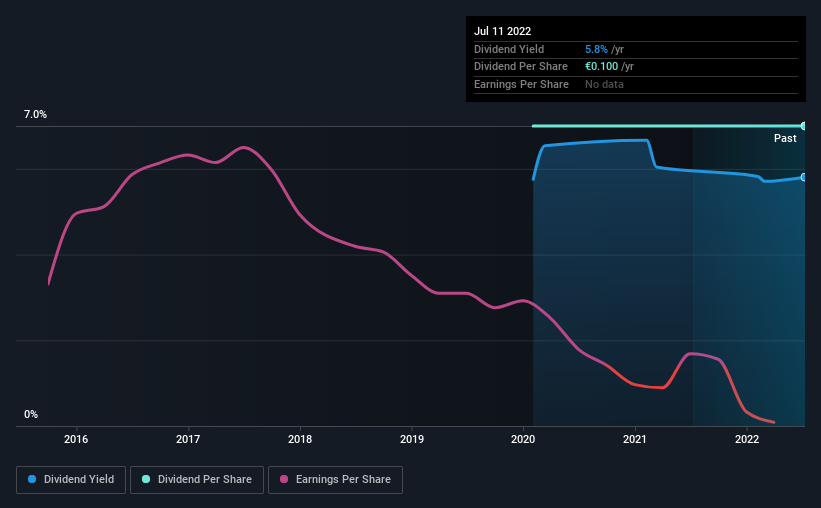- Sweden
- /
- Real Estate
- /
- OM:AKEL D
Akelius Residential Property (STO:AKEL D) Is Due To Pay A Dividend Of €0.025

The board of Akelius Residential Property AB (publ) (STO:AKEL D) has announced that it will pay a dividend on the 12th of August, with investors receiving €0.025 per share. This means the annual payment is 5.8% of the current stock price, which is above the average for the industry.
Check out our latest analysis for Akelius Residential Property
Akelius Residential Property Might Find It Hard To Continue The Dividend
If the payments aren't sustainable, a high yield for a few years won't matter that much. Akelius Residential Property isn't generating any profits, and it is paying out a very high proportion of the cash it is earning. This makes us feel that the dividend will be hard to maintain.
Looking forward, earnings per share could 64.7% over the next year if the trend of the last few years can't be broken. This means the company will be unprofitable and managers could face the tough choice between continuing to pay the dividend or taking pressure off the balance sheet.

Akelius Residential Property Doesn't Have A Long Payment History
The company has maintained a consistent dividend for a few years now, but we would like to see a longer track record before relying on it. There hasn't been much of a change in the dividend over the last 2 years. We like that the dividend hasn't been shrinking. However we're conscious that the company hasn't got an overly long track record of dividend payments yet, which makes us wary of relying on its dividend income.
The Dividend Has Limited Growth Potential
Investors who have held shares in the company for the past few years will be happy with the dividend income they have received. However, things aren't all that rosy. Akelius Residential Property's earnings per share has shrunk at 65% a year over the past five years. Such rapid declines definitely have the potential to constrain dividend payments if the trend continues into the future.
Akelius Residential Property's Dividend Doesn't Look Great
Overall, this isn't a great candidate as an income investment, even though the dividend was stable this year. The company's earnings aren't high enough to be making such big distributions, and it isn't backed up by strong growth or consistency either. Overall, this doesn't get us very excited from an income standpoint.
It's important to note that companies having a consistent dividend policy will generate greater investor confidence than those having an erratic one. However, there are other things to consider for investors when analysing stock performance. For example, we've picked out 3 warning signs for Akelius Residential Property that investors should know about before committing capital to this stock. Looking for more high-yielding dividend ideas? Try our collection of strong dividend payers.
New: Manage All Your Stock Portfolios in One Place
We've created the ultimate portfolio companion for stock investors, and it's free.
• Connect an unlimited number of Portfolios and see your total in one currency
• Be alerted to new Warning Signs or Risks via email or mobile
• Track the Fair Value of your stocks
Have feedback on this article? Concerned about the content? Get in touch with us directly. Alternatively, email editorial-team (at) simplywallst.com.
This article by Simply Wall St is general in nature. We provide commentary based on historical data and analyst forecasts only using an unbiased methodology and our articles are not intended to be financial advice. It does not constitute a recommendation to buy or sell any stock, and does not take account of your objectives, or your financial situation. We aim to bring you long-term focused analysis driven by fundamental data. Note that our analysis may not factor in the latest price-sensitive company announcements or qualitative material. Simply Wall St has no position in any stocks mentioned.
About OM:AKEL D
Akelius Residential Property
Through its subsidiaries, owns, manages, rents, restores, and upgrades residential properties in the United States, Canada, and Europe.
Low unattractive dividend payer.

